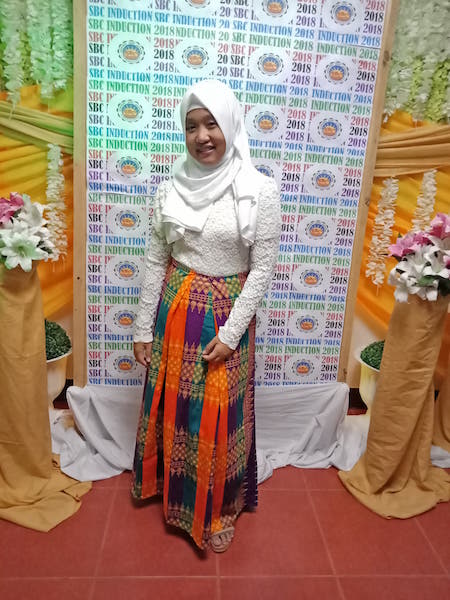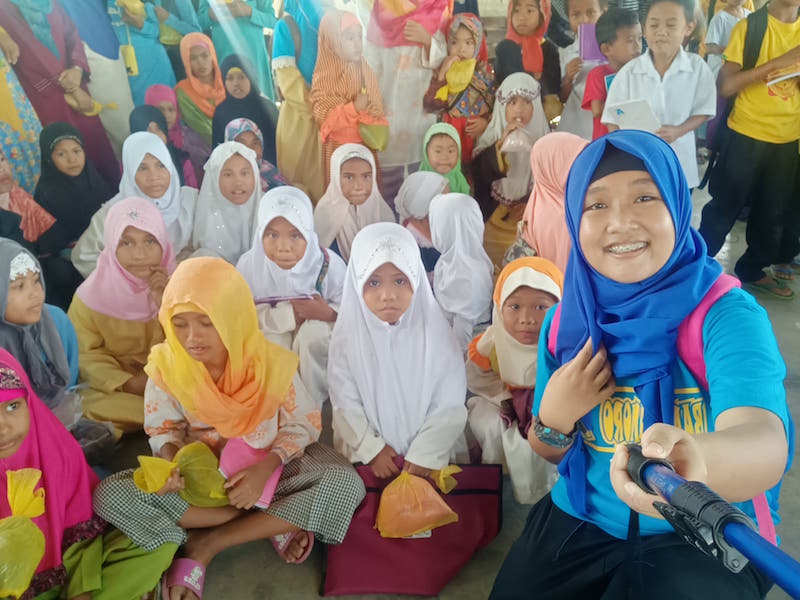“A proud Bangsamoro.”
That’s how Jana Pugoy Isla, 19, describes herself. And sport is the platform she’s chosen to express that pride. Through sports she tries to advocate peace to youth in her native Maguindanao. She’s doing her part in developing future leaders who understand the differences but focus on the commonalities, in bringing forth a generation that strives for unity and peace, because as she puts it: “People of Maguindanao are not warriors. We are peacebuilders.”
A chronic asthma condition almost kept Jana from pursuing sports. Worried about her health, her parents at first prevented her from playing badminton, the sport that was to become an important part of her life.
 Jana Pugoy Isla, 19, describes herself as “a proud Bangsamoro” and in bringing forth a generation that strives for unity and peace because “people of Maguindanao are not warriors (but) peacebuilders.” Photo from Jana’s FB page
Jana Pugoy Isla, 19, describes herself as “a proud Bangsamoro” and in bringing forth a generation that strives for unity and peace because “people of Maguindanao are not warriors (but) peacebuilders.” Photo from Jana’s FB page
“I picked up badminton already during my elementary days but my parents wouldn’t let me play much. They were very worried and protective, thinking that physical exercise would prompt an asthma attack. In high school I made it onto the volleyball varsity team. Again, they stopped me from playing competitively. At Datu Ibrahim Paglas Memorial College (DIPMC), my coach Al Rashid encouraged me to become a student coach for badminton. By then, my parents had come to realize that playing badminton and exercising my body actually helps to prevent attacks.”
Out of school youth
A student coach now, after college she wants to continue pursuing a career in sports and working with youth. That ambition informed her choice for the Bachelor of Secondary Education Major in Music, Arts, Physical Education and Health (MAPEH) at DIPMC.
In May, Jana helped organize a football clinic for out of school youth from different barangays in Maguindanao.
“Being a MAPEH major is not easy. We have to be multitalented and multitasking to pass this course. But I love it, because it gets me out of my comfort zone and allows me to try and learn new things. That experience is valuable when I try to impart what I’ve learned to young people I work with as a student coach or a community organizer.”
Supported by Datu Ibrahim College, Jana regularly conducts coach talks and student talks. Out of school youth is always invited to participate in these sessions with the aim to show them how to teach peace through sports.
“Last May we did a football clinic for out of school youth with help from the Gawad Kalinga foundation. We chose football because that’s a way to communicate that everyone can understand. Our objective is to show them that similar to how football can unite and create a level playing field, in their communities they can apply those same lessons so if they have a conflict with a different barangay, for instance, they will know how to communicate. It’s all about building strong and inclusive communities. That means containing conflicts as well before they get too big to handle.”
On and off the court
The real reward for Jana when she coaches and does clinics is not the gratitude she receives. What makes it worthwhile for her is that she gets to share her learnings.
“The reward is the feedback I get. If anything, I’m grateful to the students and young children. Because of their willingness to participate, I have an opportunity to help. One of the key lessons I try to impart is that, win or lose, you always treat your opponents as equals. That fundamental principle applies on and off the court. I encourage youth to play sports so that they may understand the unifying language of sports.”
 Jana Pugoy Isla takes a group selfie with students of a madrasah in Maguindanao. Photo from Jana’s FB page
Jana Pugoy Isla takes a group selfie with students of a madrasah in Maguindanao. Photo from Jana’s FB page
Unity is not a term all people associate with Maguindanao. Wrongfully so, finds Jana. “Maguindanao, or for that matter, Mindanao, is not defined by its conflicts. We are not warriors, we are peacebuilders. And keep in mind, we are the victims of the conflicts playing out on our island. We feel embarrassed sometimes when we hear national media reports. We make conflict? How about acknowledging us as victims? Many people don’t know the real story behind the conflicts we are facing.”
Embodying diversity
To have peace, Jana believes we should start with ourselves, with what we can control. And sports is a great tool to do just that.
“When I work with out of school youth, those most vulnerable to being dragged into conflicts, I hope they will share what they learn with their brothers and sisters. I hope they will learn, improve and develop their skills and then pass it on in their communities.”
Jana embodies the diversity of Maguindanao. Her mother is Christian, her father is Muslim, so she grew up with both traditions. This helps her to socialize with people who come from different backgrounds.
“I consider two traditions. Although Muslim teaching is of course very prominent in the Bangsamoro, it’s still possible to be true to yourself. I don’t often wear a hijab, for instance, but I do follow other traditions. Important to realize is that we’re all human beings in this world. We are worshipping one God. There’s so much we have in common. Having been brought up experiencing different traditions I think helps me be a more relatable and effective leader for youth.”
Hope of the nation
As a leader, Jana is not interested in having followers. She wants to teach the youth how to be leaders themselves so they can produce more leaders.
“Those born in the twenty-first century are uniquely positioned to advocate for real change. Because of how well integrated they are with modern technology, such as social media, they have new avenues to share knowledge and encourage others to advocate as well. Young people are the hope of the nation.”
[Together with over 40 other women student athletes from 12 colleges and universities from all 6 regions of Mindanao, Jana participated in the second annual Mindanao Leadership Summit for Athletes (MLSA) in Butuan City (July 26-28).
The MLSA is part of the Mindanao Peace Games (MPG), a joint initiative of colleges and universities across Mindanao that aims to develop empowered women who will be inspiring and transformational leaders in initiating better and peaceful communities in Mindanao.
For more information contact the Convener of the Mindanao Peace Games, Mr. Noli Ayo. You can follow MPG on Twitter (@MPG2018) and Instagram (mindanao_peace_games).
The author, Patrick van Wersch, 32, is a Dutch writer and journalist from the Hague, the Netherlands. Based in Davao City, Patrick writes stories featuring young Mindanaons. In these stories, they share their passions, hopes and challenges as they shape the future of their Mindanao. Other topics Patrick covers in his writing include peace and development, sports, and culture and society. Patrick holds an MA Degree in Journalism from VU University, Amsterdam and a BA in European Studies from Maastricht University. Visit his website atwww.vanwerschwrites.com]
